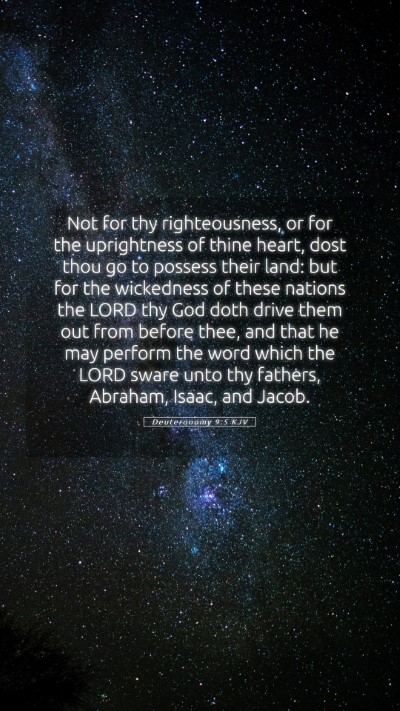Understanding Deuteronomy 9:5
Bible Verse: "Not for thy righteousness, or for the uprightness of thine heart, dost thou go to possess their land: but for the wickedness of these nations the Lord thy God doth drive them out from before thee, and that he may perform the word which the Lord sware unto thy fathers, Abraham, Isaac, and Jacob."
Summary of Insights
The passage in Deuteronomy 9:5 is pivotal as it emphasizes the grace of God in granting the Israelites the Promised Land. Various public domain commentators provide rich insights into this verse, enhancing our understanding of its significance in the broader context of Scripture.
Matthew Henry's Commentary
Matthew Henry notes that the Israelites' possession of the land was not due to their righteousness or inherent goodness. It was God's promise and action against the wickedness of other nations that facilitated their conquest. This highlights the sovereignty of God in choosing and acting through His people, despite their imperfections.
Albert Barnes' Commentary
Albert Barnes elaborates on the concept of grace, emphasizing that even though the Israelites might feel deserving, their inheritance is entirely a matter of God's covenant faithfulness. He connects the notion of righteousness not as a personal achievement but as a divine endowment and purpose.
Adam Clarke's Commentary
Adam Clarke emphasizes the historical context surrounding this verse, explaining the prevailing wickedness of the inhabitants of the land. He speaks to the moral obligation of the Israelites to follow God's commandments, serving both to honor the covenant and ensure justice in the land prepared for them.
Theological Significance
- Grace Over Works: This verse serves as a reminder that God's favor is not based on human merit, a theme echoed in New Testament theology (Ephesians 2:8-9).
- Covenant Faithfulness: The reference to Abraham, Isaac, and Jacob points towards God's steadfastness to His promises, indicating His unchanging nature.
- Moral Responsibility: While the land was given out of grace, there is still an expectation for the Israelites to uphold a righteous standard.
Key Themes and Lessons
Deuteronomy 9:5 provides several important lessons and themes that can be applied in Bible study groups and personal reflection:
- Understanding Scripture: Recognizing the distinction between human righteousness and divine favor can lead to deeper theological understanding.
- Bible Study Insights: This verse functions as an excellent discussion point in online Bible study sessions, prompting exploration of grace versus merit.
- Historical Context: Exploring the historical backdrop aids in understanding the nature of God’s actions towards Israel and the nations around them.
Application for Daily Life
Deuteronomy 9:5 encourages believers today to reflect upon their own lives concerning divine grace and righteousness:
- Humility: Understanding that blessings are given by grace rather than personal worth encourages humility.
- Faithfulness: Believers are encouraged to strive for righteousness in recognition of God’s faithfulness and the holiness of His calls.
- Reflecting God's Character: Just as Israel was called to be a light to the nations, Christians are similarly called to represent God's character in the world.
Related Bible Verses
- Exodus 33:19 - God's answer to Moses about His grace.
- Romans 9:16 - The reliance on God's mercy rather than human effort.
- Deuteronomy 7:7-8 - Further emphasis on the reasons for God's choice of Israel.
Conclusion
In conclusion, Deuteronomy 9:5 serves as a significant reminder of God's sovereignty and grace. Through various commentaries, one can gain deeper insights into its implications both in the historical context and for contemporary faith applications. This verse, rich in meaning, opens avenues for extensive Bible verse interpretations, enhancing both individual and communal understanding in Bible study settings.


